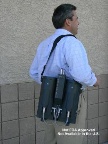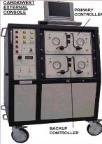| Cardiology | |||||
Heart surgery patients can recover at home with portable artificial heart1 June 2006 Tucson, Arizona USA. Berlin Heart AG, maker of the Excor Ventricular Assist Devices for children and adults, has received the European CE Mark, which allows it to market a modified version of its Excor Mobile Driving Unit with the CardioWest TAH-t in Europe.
The new Excor TAH-t portable driver is about the size of an attaché case and weighs only 20 pounds. It is designed for use following TAH-t implant surgery, by stable patients. The portable driver allows stable patients to recover at home, which speeds recovery, improves quality of life and dramatically lowers costs. In addition, the portable driver enables patients to leave home to shop, and for some, to travel.
"The portable driver gives patients more freedom to enjoy a better quality of life ... and because many patients recuperate in the comfort of their homes, hospitalization costs for this portion of their recovery are eliminated," explained Cardiologist Marvin Slepian, M.D., chairman of SynCardia. A New England Journal of Medicine paper published in August 2004 states that, in the pivotal clinical study of the TAH-t, the one-year survival rate for patients receiving the CardioWest temporary Total Artificial Heart was 70% versus 31% for control patients who did not receive the device. SynCardia has applied for its own CE mark which will allow the company to market its TAH-t with the Excor TAH-t in Europe, and anticipates approval in the second quarter of 2006. The Excor driver is not approved by the FDA for use in the United States. The TAH-t is a modern version of the Jarvik-7 Artificial Heart that was implanted in Barney Clark in 1982. In the 1990s the device and technology moved to University Medical Center (UMC) in Tucson and was subsequently renamed the CardioWest temporary Total Artificial Heart. Budget cutbacks at UMC came close to stopping the study of this technology. To save the TAH-t, SynCardia Systems Inc. was formed in 2001 by Marvin J. Slepian, M.D., Richard G. Smith, MSEE, CCE, and cardiovascular surgeon Jack Copeland, M.D.
|

